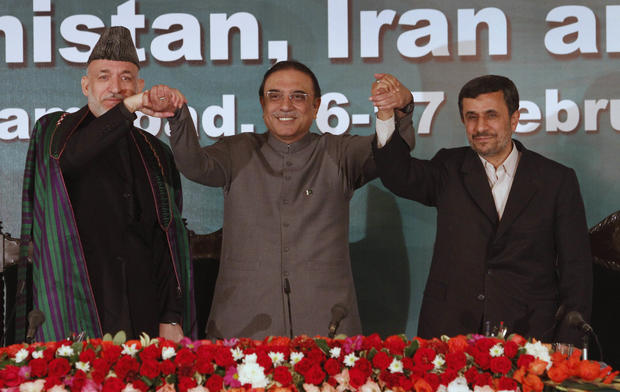Fostering ties, Iran offers to fund pipeline in Pakistan
Iran's president Mahmoud Ahmedinejad has quietly offered to finance the Pakistani portion of a multinational gas pipeline project opposed by the United States, in a strong signal of Tehran's intent to build closer ties with its neighbor.
Ahmedinejad left Pakistan Friday after meeting with Pakistan's president Asif Ali Zardari and Afghan president Hamid Karzai, a trilateral summit seeking a formula to stabilize conditions in Afghanistan.
A joint statement issued by Pakistan's foreign ministry after the meeting said the three countries agreed to "develop mutually beneficial cooperation in the energy, mining and minerals, agriculture and other sectors" without providing further details.
But an Iranian official in Islamabad who spoke to CBS News on condition of anonymity said, "The IP [Iran-Pakistan] gas pipeline is very close to our heart. President Ahmedinejad indicated Iran's intent to finance the project on the Pakistani side if Pakistan has difficulty with finding the money".
Though an exact cost is not known yet, the Iranian official said that "Iran was ready to start from financing $1.5 billion for the project and build it up further if needed."
The project is proposed to transport surplus gas from southern Iran. In the past, Pakistani officials have speculated that the supply line could be extended to India and China.
A Pakistani official who also spoke to CBS News on condition of anonymity confirmed the offer, though he said "it is still early to tell if Pakistan will go ahead with the project" in defiance of the U.S. In the past, U.S. officials have opposed the plan on the grounds that it will inject large new revenue in Iran's ailing economy and further embolden the hard line Islamist country.
Asked about the pipeline Friday, Zardari said, "Iran and Pakistan are neighbors. We need to interdepend on each other. Our bilateral relationships cannot be considered or undermined by any international pressure of any kind."
Last summer, Iranian officials surprised their Pakistani counterparts when they disclosed that Iran had already built the pipeline to within 50 kilometers of Pakistan's border. The revelation from Iranian officials came just months after Pakistan experienced ugly riots in some of its larger cities when protests broke out over gas shortages.
The Pakistani official who spoke to CBS News said, "Theoretically, it would make a great deal of sense for Pakistan to import gas from Iran. The U.S. may oppose the project, but the Americans have no alternative to offer for providing relief to Pakistanis. When people are protesting because they can't cook food at home, the compulsion to do whatever is necessary becomes very strong."
But a western diplomat in Islamabad who also spoke to CBS News on condition of anonymity said Iran is facing growing economic difficulties due to its international isolation.
"Promising billions of dollars for a gas pipeline project to Pakistan is much easier to talk about than being done," he said."Even if the U.S. was to withdraw its objections, we can't imagine this project to be put in place overnight."
